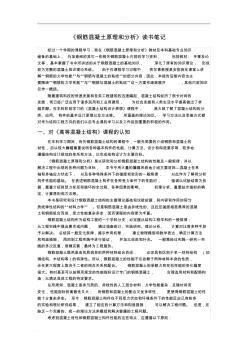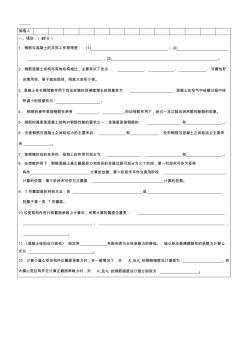Principles of Reinforced Concrete 钢筋混凝土原理
- Principles of Reinforced Concrete 钢筋混凝土原理基本信息
- Principles of Reinforced Concrete 钢筋混凝土原理造价信息
- Principles of Reinforced Concrete 钢筋混凝土原理图书简介
- Principles of Reinforced Concrete 钢筋混凝土原理目录
- Principles of Reinforced Concrete 钢筋混凝土原理常见问题
- Principles of Reinforced Concrete 钢筋混凝土原理文献
- Concrete英文解释及短语搭配
- PrinciplesofReinforcedConcrete钢筋混凝土原理图书详细信息
- Concrete双语例句
Principles of Reinforced Concrete 钢筋混凝土原理基本信息
| 书 名 | Principles of Reinforced Concrete 钢筋混凝土原理 | 作 者 | Zhenhai Guo·过镇海 |
|---|---|---|---|
| 出版社 | 清华大学出版社 | 出版时间 | 2014年12月1日 |
| 定 价 | 138 元 | 装 帧 | 精装 |
| ISBN | 9787302385301 | 印 次 | 1-1 |
| 印刷日期 | 2014-12-9 | ||
Principles of Reinforced Concrete 钢筋混凝土原理
作者:Zhenhai Guo·过镇海
定价:138元
印次:1-1
ISBN:9787302385301
出版日期:2014.12.01
印刷日期:2014.12.09
出版社:清华大学出版社
Principles of Reinforced Concrete 钢筋混凝土原理造价信息
本书详细介绍结构混凝土的主要材料特点和各种受力和变形性能,以及混凝土和钢筋共同工作的特殊性能。进而以试验为基础,概括了基本构件在各种内力作用下的性能变化规律、工作机理和计算方法,从而揭示了钢筋混凝土用作一种组合结构材料的基本原理和分析方法。对于工程中可能遇到的一些极端工况,包括疲劳、地震、爆炸、高温(火灾)和耐久性损伤等,介绍了材料和构件的特殊性能及其分析方法。本书是以结构工程专业研究生编写的同名课程的教材,也适合相似专业本科生的教与学;对于从事结构工程有关的科学研究、设计和施工的技术人员,在处理工程问题时也可用作参考。 2100433B
Contents
Preface .XI
CHAPTER 1 Introduction. 1
1.1 Development and features of reinforced concrete structure.1
1.2 Characteristics of this course.4
PART 1 MECHANICAL BEHAVIOR OF CONCRETE
CHAPTER 2 Basic Mechanical Behavior9
2.1 Material composition and characteristic10
2.1.1 Composition and internal structure10
2.1.2 Basic characteristics .13
2.1.3 General mechanism of failure process.17
2.2 Compressive strength.19
2.2.1 Cubic compressive strength19
2.2.2 Failure process of prism specimen.21
2.2.3 Main indices of mechanical behavior24
2.3 Complete compressive stressestrain curve.28
2.3.1 Testing method28
2.3.2 Equation for complete curve29
2.4Tensilestrengthanddeformation33
2.4.1Testingmethodandindexoftensilebehavior.33
2.4.2Tensilefailureprocessandcharacteristic39
2.4.3Equationofcompletestressestraincurve42
2.5Shearstrengthanddeformation.44
2.5.1Rationaltestingmethod44
2.5.2Failurecharacteristicandshearstrength48
2.5.3Shearstrainandmodulus.49
CHAPTER3BehaviorUnderIn.uenceofMainFactors.53
3.1Loadactedrepeatedly54
3.2Eccentriccompression.59
3.2.1Testingmethod59
3.2.2Mainexperimentalresults60
3.2.3Stressestrainrelation64
3.3Eccentricand.exuraltensions66
3.3.1Failureprocess66
3.3.2Ultimatetensilestrengthandplasticity-dependentcoef.cient67
3.3.3Themaximumtensilestrainatultimateload69
3.3.4Variationsofstrainandneutralaxisofsection69
3.3.5Equationsforcompletestressestraincurve.70
3.4 Age.71
3.4.1Compressivestrength72
3.4.2Modulusofelasticity74
3.5 Shrinkage75
3.5.1Kindandquantityofcement76
3.5.2Property,size,andquantityofaggregate.76
3.5.3Curingcondition.76
3.5.4Environmentalconditionofservicestage76
3.5.5Shapeandsizeofstructuralmember.76
3.5.6Otherfactors.76
3.6 Creep78
3.6.1Basicconcept78
3.6.2Mainin.uencefactors82
3.6.3Calculationformulas.85
CHAPTER4VariousStructuralConcrete89
4.1 High-strengthconcrete.90
4.1.1Applicationandpreparation.90
4.1.2Basicmechanicalbehavior.92
4.2 Light-weightconcrete99
4.2.1Classi.cation.99
4.2.2Basicmechanicalbehavior.101
4.3 Fiberconcrete.106
4.3.1Classi.cation.106
4.3.2Basicmechanicalbehavior.108
CHAPTER5MultiaxialStrengthandConstitutiveRelation113
5.1 Experimentalequipmentandmethod115
5.2 Generalregularitiesofmultiaxialstrengthanddeformation.118
5.2.1Biaxialstressstates.119
5.2.2Triaxialstressstates122
5.2.3Differentmaterialsandloadingpaths129
5.3 Typicalfailurepatternsandtheirboundaries132
5.3.1Breakingintension.132
5.3.2Columnarcrushing133
5.3.3Splittingintopieces134
5.3.4Inclinedshearing.134
5.3.5Extrudingandshifting135
5.4Failurecriterion137
5.4.1Shapeoffailureenvelopeanditsexpression.137
5.4.2Failurecriterion141
5.4.3Calculationchartsformultiaxialstrength146
5.5Constitutiverelation.147
5.5.1Modelsoflinearelasticity149
5.5.2Modelsofnon-linearelasticity.150
5.5.3Modelsofothercategories.151
PART2 COMBINATIONFUNCTIONOFREINFORCEMENTANDCONCRETE
CHAPTER6MechanicalBehaviorofReinforcement.159
6.1Reinforcementusedinconcretestructure.159
6.1.1Reinforcement(diameter6e40mm).160
6.1.2High-strengthwire(diameter4e9mm)161
6.1.3Shapesteel161
6.1.4Ferrocement162
6.1.5Othersubstitutivematerials162
6.2Stressestrainrelation.163
6.2.1Mildsteel163
6.2.2Hardsteel(wire).166
6.3Deformationunderactionofcyclicloads.167
6.4Behavioraftercold-worked.172
6.4.1Cold-stretchingandage-hardening173
6.4.2Cold-drawn.175
6.5Creepandrelaxation176
6.5.1Kindofsteel.178
6.5.2Sustainingtimeofcontrolstress178
6.5.3Stresslevel178
6.5.4Temperature179
CHAPTER7BondBetweenReinforcementandConcrete.181
7.1Functionandcompositionofbond182
7.1.1Functionandclassi.cation.182
7.1.2Composition184
7.2Testmethodandbondmechanism186
7.2.1Testmethod.186
7.2.2Plainreinforcement.189
7.2.3Deformedreinforcement.190
7.3In.uencefactors.193
7.3.1Strengthofconcrete(fcuorft)194
7.3.2Thicknessofconcretecover(c).195
7.3.3Bondlengthofreinforcement(l).195
7.3.4Diameterandshapeofreinforcement196
7.3.5Transversestirrup(rsv).197
7.3.6Transversecompressivestress(q)198
7.3.7Otherfactors.198
7.4Constitutivemodelforbondstresseslip.199
7.4.1Calculationofcharacteristicvalues.200
7.4.2Equationforsescurve.201
CHAPTER8MechanicalBehaviorUnderAxialForce205
8.1Compressivemember.206
8.1.1Basicequations.206
8.1.2Analysisofstressandstrain(ey
8.1.3Analysisofstressandstrain(ey>ep)210
8.2Tensilemember212
8.2.1Basicequationsforanalysis.212
8.2.2Analysesofstressanddeformationwithineverystage213
8.2.3Minimumreinforcementrate215
8.2.4Tensionstiffening.216
8.3Generalregularity218
CHAPTER9Con.nedConcrete.221
9.1Columnwithspiralbar222
9.1.1Mechanicalmechanismandfailureprocess222
9.1.2Ultimatestrength224
9.2Rectangulartiedcolumn226
9.2.1Failureprocess226
9.2.2Workingmechanismofrectangulartie229
9.2.3Equationforcompletestressestraincurve234
9.3Steel-tube-con.nedconcrete238
9.3.1Mechanicalcharacteristicandmechanism.238
9.3.2Calculationofultimatestrength.241
9.4Localcompression.244
9.4.1Mechanicalcharacteristicandmechanism.244
9.4.2Calculationofstrength.249
CHAPTER10 MechanicalResponseofDeformationDifference253
10.1Shrinkageofconcrete254
10.1.1Generalanalysismethod254
10.1.2Practicalcalculationmethod256
10.2 Difference of thermal deformation259
10.3 Creep of concrete.263
10.3.1 Stress redistribution on section under sustained load .263
10.3.2 Stress state after unloaded265
PART 3 STRENGTH AND DEFORMATION OF STRUCTURAL MEMBER
CHAPTER 11 Strength of Member Under Compression and Bending 269
11.1 Mechanical process and failure pattern.269
11.1.1 Rectangular beam with tensile reinforcement only . 269
11.1.2 Suitably, less-, and over-reinforced beams 272
11.1.3 Eccentrically compressed column (and tensed member)275
11.2 Additional .exure of long column280
11.3 General method for sectional analysis283
11.4 Ultimate strength .289
11.4.1 Calculation formulas 289
11.4.2 Member under biaxial bending 295
11.5 Members of various materials and structural details298
11.5.1 High-strength concrete . 298
11.5.2 Light-weight concrete. 299
11.5.3 Reinforcements with different strengths 300
11.5.4 Reinforcement without yielding plateau301
11.5.5 Reinforcements distributed along sectional depth.301
11.5.6 Non-rectangular sections 303
Principles of Reinforced Concrete 钢筋混凝土原理常见问题
Principles of Reinforced Concrete 钢筋混凝土原理文献

 钢筋混凝土原理与分析
钢筋混凝土原理与分析
. . 《钢筋混凝土原理和分析》读书笔记 经过一个学期的课程学习,我在《钢筋混凝土原理和分析》教材及本科基础专业知识 储备的基础上, 外加查阅的其它一些相关钢筋混凝土内容的学习资料, 包括教材、 专著及论 文等,基本掌握了书中所讲述的关于钢筋混凝土的基础知识, 深化了原有的知识理论, 形成 较为完整的混凝土知识理论系统。 由于在课程学习过程中, 贺东青教授是安排我在课堂上讲 解“钢筋的力学性能”与“钢筋与混凝土的粘结”的部分内容,因此,本报告后续内容也主 要围绕“钢筋的力学性能”与“钢筋与混凝土的粘结”这一方面作细致展开 ,其他内容知识 仅作一概括。 随着建筑科技的快速发展和各类工程建筑的迅速崛起,混凝土结构经历了很长时间的 发展,现已经广泛应用于诸多民用和工业用建筑, 为社会发展和人类生活水平提高做出了卓 越贡献。在本科阶段学习的《混凝土结构设计原理》课程中, 我大致了解了混凝土结构

 钢筋混凝土基本原理E
钢筋混凝土基本原理E
阅卷人 一、填空:(20分) 1.钢筋与混凝土的共同工作原理是: (1) ;(2) ; (3) 。 2.钢筋混凝土结构与其他结构相比,主要有以下优点: 、 、 、可模性好、 合理用材、易于就地取材、刚度大变形小等。 3.混凝土在长期荷载作用下其应变随时间继续增长的现象称为 ,混凝土在空气中结硬过程中体 积减小的现象称为 。 4. 钢筋的疲劳是指钢筋在承受 、 的动荷载作用下,经过一定次数后突然脆性断裂的现象。 5.钢筋的强度是混凝土结构对钢筋性能的要求之一,该强度是指钢筋的 和 。 6.光面钢筋与混凝土之间粘结力的主要来自 和 ,变形钢筋与混凝土之间粘结力主要来 自 。 7.按照随时间的变异性,结构上的作用可划分为 、 和 。 8.在荷载作用下,钢筋混凝土梁正截面受力和变形的发展过程可划分为三个阶段,第一阶段末可作为受弯 构件 计算的依据,第二阶段末可作为使用阶段 计算的依据,第三阶段末
1、a strong hard building material composed of sand and gravel and cement and water
Reinforced Concrete 钢筋混凝土 ; 纤维增强混凝土 ; 被加固的混凝土
concrete vibrator [建] 混凝土振捣器 ; [建] 混凝土振动器 ; 混凝土震捣器
bituminous concrete [建] 沥青混凝土 ; 泊油路
foam concrete [建] 泡沫混凝土 ; 发泡混凝土 ; 房屋地政
concrete core 混凝土芯 ; 土芯 ; 混凝土心 ; 石矢尖凿
armored concrete 钢筋混凝土 ; 配筋混凝土 ; 钢筋的混凝土
concrete slab [建] 混凝土板 ; 混泥土板 ; 混凝土样本
concrete foundation 混凝土基础 ; 混凝土地基 ; 混泥土基础 ; 混凝土根蒂根基
2、tangible,something that can be percieved through sense
Concrete Product 具体产品 ; 实产品 ; 具体产品角色 ; 产品类
concrete evidence/proposals/proof确凿的证据;具体的建议;确实的证明
3、If a plan or idea isset in concreteorembedded in concrete, it is fixed and cannot be changed.
As Mr Blunkett emphasised, nothing is yet set in concrete.
正如布伦基特先生所强调的,一切都还没有定下来。
Principles of Reinforced Concrete 钢筋混凝土原理
作者:Zhenhai Guo·过镇海
ISBN:9787302385301
定价:138元
印次:1-1
装帧:精装
印刷日期:2014-12-9
Our teaching should be alive, that it. concrete and experiential.
我们的教学应该是活的,它就是混凝土和体验。
Do not knead the pastry at this point or it will be like concrete.
别在这个时候捏油酥面团,不然它会变得像混凝土那样硬。
Have you any concrete plans about how to deal with these difficulties"para" label-module="para">
对怎样解决这些困难,你有没有什么具体的计划"sup--normal" data-sup="1" data-ctrmap=":1,"> [1]
专业例句: Basedonlargenumbersofexistingbridges,thispaperanalyzesandstudiesthedominantfactorswhichaffectthedurabilityofthereinforcedconcretebridges,suchastherustinessofreinforcingsteelbar,thefreeze-thawcycleofconcrete,thealkaline-aggregatereactionofconcrete.
本文根据大量的已建钢筋混凝土桥梁的运营状况,分析研究了影响钢筋混凝土桥梁结构耐久性的主要因素,如钢筋的锈蚀、混凝土的冻融循环、混凝土的碱集料反应等。2100433B
- 相关百科
- 相关知识
- 相关专栏
- Pro/DETAIL Wildfire 3.0工程图设计
- Pro/E机械设计与工程应用精选50例
- Pro/ENGINEER 野火版4·0 机械工程应用基础(第二版)
- Pro/ENGINEER ECAD
- Pro/Engineer Wildfire 3.0入门到精通教程
- Pro/Engineer Wildfire 3.0典型机械零件设计手册
- Pro/ENGINEER Wildfire 3.0工程图制作
- Pro/ENGINEER Wildfire 3.0曲面造型设计
- Pro/ENGINEER Wildfire 4三维造型实例图解
- Pro/ENGINEER Wildfire 4.0中文版参数化设计从入门到精通
- PRO/ENGINEER WILDFIRE 4.0中文版工业设计手册
- Pro/ENGINEER Wildfire 5·0工程结构有限元分析
- Pro/ENGINEER Wildfire 5.0产品设计一体化解决方案
- Pro/ENGINEER Wildfire 5.0工程结构有限元分析
- Pro/ENGINEER Wildfire 5.0技术应用项目式教程
- Pro/ENGINEER Wildfire三维造型设计实例教程
- 一拖一变频柜电气原理图(三晶VM1000B系列)
- 圆锥碎矿机工作原理、技术参数、安装调试及维护检修
- 圆形截面预应力钢筋混凝土悬臂式支护桩的分析与应用
- 中、小跨径钢筋混凝土拱桥现浇支架(拱架)设计指南
- 圆形截面钢筋混凝土受弯构件正截面承载力的简化计算
- 张力式电子围栏周界防范报警系统设计原理及应用现状
- 应用TAT和SATWE对钢筋混凝土框剪结构
- 应用型人才培养为导向的高等钢筋混凝土结构课程改革
- 圆形钢筋混凝土截面大偏压构件正截面承载力的简算法
- 以工程实践为导向的钢筋混凝土结构课程教学方法
- 以位移为基础的钢筋混凝土桥梁墩柱抗震设计方法
- 柘溪水电站引水隧洞钢筋混凝土衬砌仿真模型试验
- 依萨河二级水电站钢衬钢筋混凝土地面管与应用
- 应用生物技术专业化工原理课程的教学改革与实践
- 柘溪水电站引水隧洞钢筋混凝土衬砌结构的可靠性分析
- 影响砌体墙钢筋混凝土墙组合结构抗震性能的因素